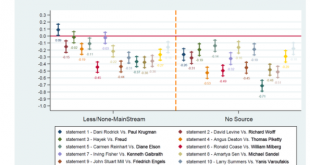from Dean Baker Presidential candidate Joe Biden is considering to propose a financial transactions tax as part of his campaign for the Democratic nomination, according to a recent report from The Washington Post. This is big news for those of us who have long advocated such a tax. Sen. Bernie Sanders has taken the lead on this issue among presidential candidates, including a financial transactions tax — also known as an FTT — as part of his plan for making college tuition free. Several...
Read More »What is MMT?
from L. Randall Wray MMT provides an analysis of fiscal and monetary policy that is applicable to national governments with sovereign currencies. We argue that there are four essential requirements that qualify a national currency as sovereign in the sense in which we use the term: the National government chooses a money of account in which the currency is denominated; the National government imposes obligations (taxes, fees, fines, tribute, tithes) denominated in the chosen money of...
Read More »Teflon economics
from Lars Syll At least since the time of Keynes’s famous critique of Tinbergen’s econometric methods, those of us in the social science community who have been impolite enough to dare to question the preferred methods and models applied in quantitative research in general and economics more specifically, are as a rule met with disapproval. Although people seem to get very agitated and upset by the critique — just read the commentaries on this blog if you don’t believe me — defenders of...
Read More »Canadian Political Economy on Staple Thesis
In an impressive overview of the state of Canadian Political Economy, a new book Change and Continuity ed. by Mark P. Thomas et.al. includes two important articles on the continuing relevance of the staple thesis. On the one hand, Jim Stanford’s “Staples Dependence Renewed and Betrayed: Canada’s Twenty-First Century Boom and Best” does just as its title tells because of the reversion to dependence on petroleum as a staple export since 2000 and the deindustrializing effect...
Read More »Canadian Political Economy on Staple Thesis
In an impressive overview of the state of Canadian Political Economy, a new book Change and Continuity ed. by Mark P. Thomas et.al. includes two important articles on the continuing relevance of the staple thesis. On the one hand, Jim Stanford’s “Staples Dependence Renewed and Betrayed: Canada’s Twenty-First Century Boom and Best” does just as its title tells because of the reversion to dependence on petroleum as a staple export since 2000 and the deindustrializing effect on the national...
Read More »An ideology called consumerism
We are guided by an ideology so familiar and pervasive that we do not even recognise it as an ideology. It is called consumerism. It has been crafted with the help of skilful advertisers and marketers, by corporate celebrity culture, and by a media that casts us as the recipients of goods and services rather than the creators of political reality. It is locked in by transport, town planning and energy systems that make good choices all but impossible. It spreads like a stain through...
Read More »Central Bank History (3/5) 1914-1980
from Asad Zaman This series of posts is based on a single lecture (Lecture 13 of Advanced Macro II) exploring the evolving functions of Central Banks through time. It goes through a vast amount of material in a very short time, and hence is a very sketchy treatment. This is the 3rd post, which deals with the period from WW! to the 1980s. read more
Read More »Tribalism in Science (and Economics)
from Blair Fix If you ask the average person what ‘science’ is, they’ll probably answer something like ‘it’s what we know about the world’. To the lay person, ‘science’ is a body of facts. To the trained scientist, however, ‘science’ means something different. It’s not a body of knowledge. It’s a method for determining what’s true and what’s not. To determine the way the world works, science appeals to evidence.The ideal of science is beautifully summarized by the motto of the Royal...
Read More »RWER issue 89: Modern monetary theory and its critics
real-world economics review Please click here to support this journal and the WEA issue no. 89Modern monetary theory and its criticsdownload whole issue Introduction: Whither MMT?The editors Alternative paths to modern money theoryL. Randall Wray Initiating a parallel electronic currency in a eurocrisis country – why it would workTrond Andresen An MMT perspective on macroeconomic policy spacePhil Armstrong Monetary sovereignty is a spectrum: MMT and developing countriesBruno Bonizzi,...
Read More » Heterodox
Heterodox


